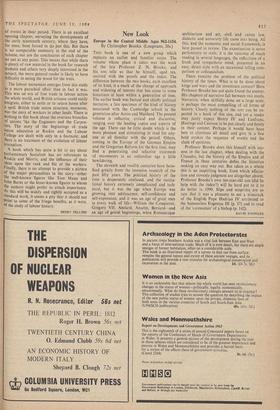New Look
THIS book is one of a new group which replaces an earlier and familiar series. The volume whose place it takes was the work of the late Professor Z. N. Brooke, and his son tells us that he himself, aged ten, assisted with the proofs and the index. The difference between the two books, each excellent of its kind, is a mark of the change of approach and widening of interest that has come to some historians at least within a generation of time. The earlier book was factual and chiefly political narrative, a late specimen of the kind of history associated with the Cambridge school in the generation after Acton and Maitland. The present volume is reflective, critical and discursive, ranging over the leading topics and aspects of the age. There can be little doubt which is the more pleasant and stimulating to read for any- one at all familiar with the period. Others, coming to the. Europe of the German Empire and the Gregorian Reform for the first time, may find a penetrating and selective treatment of movements in an unfamiliar age a little bewildering.
The eleventh and twelfth centuries have bene- fited greatly from the intensive research of the past fifty years. The political history of the time is desperately confused, and the institu- tional history extremely complicated and tech- nical, but it was the age when Europe was growing into adolescence, self-confidence and self-expression, and it was an age of great men in every walk of life—William the Conqueror, Gregory VII, Abelard, Anselm, Bernard--and an age of genial beginnings, when Romanesque architecture and art, civil and canon law, dialectic and university life came into being. All this, and the economic and social framework, is here passed in review. The examination is never perfunctory or stale; it is the outcome of much reading in several languages, the reflections of a frank and sympathetic mind, presented in an easy, direct style with an occasional telling com- parison or colloquialism.
There remains the problem of the political history of the times. What is to be done about kings and wars and the investiture contest? Here Professor Brooke has not'quite found the answer. His chapters of narrative fall between two stools. Narrative, when skilfully done on a large scale, is perhaps the most compelling of all forms of history. Clearly nothing of the sort can be ex- pected in a book of this size, and yet a reader may justly expect Henry IV and Lanfranc, Hastings and Canossa to be put clearly and firmly in their context. Perhaps it would have been best to eliminate all detail and give in a few bold strokes the sequence of events and the clash of opinions.
Professor Brooke does this himself with suc- cess in the last chapter, when dealing with the Crusades, but the history of the Empire and of France in these centuries defies the historian seeking an easy way out. But taken as a whole this is an inspiriting book, from which affecta- tion and slovenly judgment are altogether absent. Professor Brooke's own ten-year-old son (did he help with the index?) will be hard put to it to do better in 1990. Slips and misprints are so rare that it was a pleasure to see a wisecrack of the English Pope Hadrian IV attributed to the humourless Eugenius III (p. 17) and to read of the 'coronation' of a bishop (p. 142).
DAVID KNOWLES






























 Previous page
Previous page